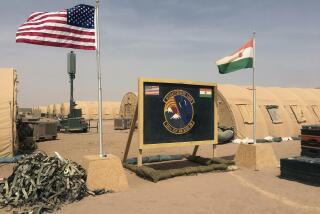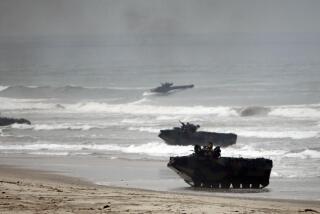Camp Pendleton Marines return from Africa
CAMP PENDLETON — Call it the forgotten front. The deployments are long, often tedious, sometimes quite dangerous.
The weather is hot, the incremental business of improving infrastructure can be frustrating, and most Americans probably could not find the country on a map.
But the U.S. is determined to keep insurgents, homegrown or from neighboring Somalia, from toppling the government of Djibouti or using the country as a launching pad. Marines have been deploying there for a decade, with no end in sight.
Early Friday morning, more than 200 Marines from the 3rd Low Altitude Air Defense Battalion (3rd LAAD) returned to Camp Pendleton from a seven-month deployment spent manning checkpoints to deter suicide bombers, conducting joint patrols with the Djibouti army and completing small civic projects, including a new water well in Chebellier and school repairs in Damerjog.
Like all deployments, the seven months have brought stress and loneliness to families left behind.
Although deployments to Iraq and Afghanistan may be more dangerous, having a spouse stationed in Djibouti means constantly explaining.
“People just say, ‘Djibouti? Do we really have troops there?’ ” said Veronica Crim as she waited for the arrival of her husband, Capt. Christopher Crim. “It becomes a joke: ‘Our husbands are doing their duty in Djibouti.’ ”
Kasey Camp had come to greet her husband, Lance Cpl. Matthew Camp, and present him with their 3-week-old daughter, Ava.
“People just don’t know much about Africa,” she said. “You have to keep telling them, ‘Yes, the Marines are there, and my husband is one of them.’ ”
Eighth-grade teacher Dee Dunbar said her students in Philadelphia were amused every time she mentioned that her son, Cpl. Josh Dunbar, was in Djibouti. “They laughed because, well, Djibouti sounds like something else,” she said.
Shortly before 3 a.m., as the buses bringing the Marines from March Reserve Air Base in Riverside pulled into a Camp Pendleton parking lot, several hundred family members cheered and waved signs and pressed forward for first glimpses.
“We did our job, we made some friends and we all came back safely,” said Gunnery Sgt. Mahlon Driver as he hugged his 15-month-old daughter, Savannah.
(The battalion’s only fatality occurred in Iraq with the death last week of Maj. William G. Hall of Seattle. Hall had been sent to work with the Iraqi police and was killed by a roadside bomb.)
In Djibouti, the battalion’s main duty was to provide security for Camp Lemonier, a base built for the French Foreign Legion that is now headquarters for the Combined Joint Task Force-Horn of Africa. The task force includes the U.S. military, the State Department and the U.S. Agency for International Development.
Marines also completed 120 civil-affairs projects in neighboring villages and 160 joint patrols with the Djibouti army.
Compared with deployments in Iraq or Afghanistan, the Djibouti mission is considered “non-kinetic,” Marine jargon for non-combat. Combat is the “near battle,” but winning hearts and minds, and thwarting insurgent groups in their recruitment efforts, is the “deep battle.”
Col. Aaron Potter, the battalion commander, said convincing young Marines of the importance of their assignment in Djibouti can be difficult. Most enlisted after Sept. 11 in hopes of seeing combat, he said.
“You keep telling them: ‘We have to fight and win the deep battle or you’re going to have to fight a near battle someday,’ ” he said.
--
More to Read
Sign up for Essential California
The most important California stories and recommendations in your inbox every morning.
You may occasionally receive promotional content from the Los Angeles Times.










